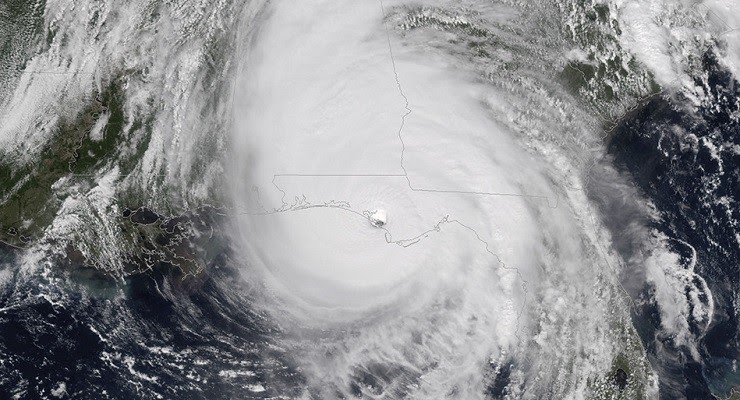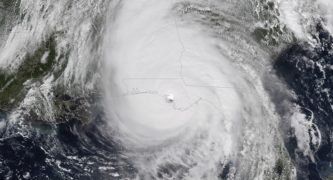
New research conducted by a Jet Propulsion Laboratory scientist and a team of colleagues in Alabama and Texas has uncovered an important clue toward understanding what causes hurricanes to suddenly and dramatically increase in strength as they make landfall in a rare, dangerous and traditionally unpredictable weather phenomenon, JPL announced Thursday.
The study, published last month in Nature Communications, focused in particular on Hurricane Michael of 2018, but scientists believe the findings apply to other storms as well, JPL said in a written statement.
“Hurricane Michael intensified from a Category 2 to a Category 5 storm the day before it made landfall in the Florida Panhandle,” the statement said. “Michael is the most intense storm on record to hit the area, having left some $25 billion in damage in its wake.”
Generally, hurricanes tend to weaken as they reach shore, according to JPL. But on rare occasions, they exhibit rapid growth, like Michael.
“Because current weather models can’t accurately predict this sudden intensification, communities preparing for a lesser storm often don’t have time to respond to the arrival of a much stronger one or to the magnitude of destruction it is likely to leave behind,” the statement said.
JPL scientist and a co-author of the study Severine Fournier, along with fellow researchers at Texas A&M University, the University of South Alabama, and the Dauphin Island Sea Lab in Alabama, set out to understand the reason for Michael’s explosive growth upon hitting land.
They examined data from weather buoys and satellites to closely examine ocean conditions before, during, and after the hurricane swept through the region, JPL said. They determined heat patterns in the waters just off the coast appear to be responsible.
“We analyzed the events that led up to Hurricane Michael in 2018 and found that the storm was preceded by a marine heatwave, an area of the coastal ocean water that had become abnormally warm,” according to Fournier. “Marine heatwaves like this one can form in areas that have experienced back-to-back severe weather events in a short period of time.”
The team determined that Tropical Storm Gordon, which blew through the same area about a month before Michael, set the stage for the hurricane to grow massive.
In general, tropical storms and hurricanes tend to churn up cooler water from below the surface of the ocean as they approach land, which reduces their energy, researchers explained.
“But Tropical Storm Gordon was immediately followed by a severe atmospheric heat wave during which the warm air heated the cooler ocean water that had recently been brought to the surface,” the JPL statement said. “This, combined with the warm water that Gordon had pushed down through the water column, ultimately produced plenty of warm-water fuel for an incoming hurricane.”
More heat in the water leads to more powerful winds in the hurricane.
“Hurricanes feed off the heat of the ocean, so this sequence of weather events created conditions that were ideal for hurricane intensification,” Fournier said.
The scientist noted that Hurricane Laura and Hurricane Sally, which struck the Gulf Coast earlier this year, seem to have “similar setups” as Michael, as they were both preceded by smaller storms.
Fournier isn’t the only JPL researcher studying erratic hurricane behavior.
Another paper published in August described how JPL scientists had used an advanced machine learning algorithm to help improve hurricane predictions.
“Both studies bring us closer to understanding and being better able to forecast rapid intensification of hurricanes near landfall,” the statement said.
See also:
JPL Machine-Learning Project Could Help Predict Dangerous Hurricane Behavior














 0 comments
0 comments


